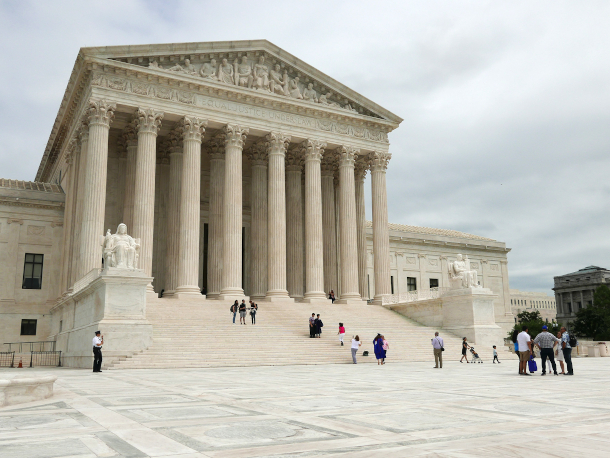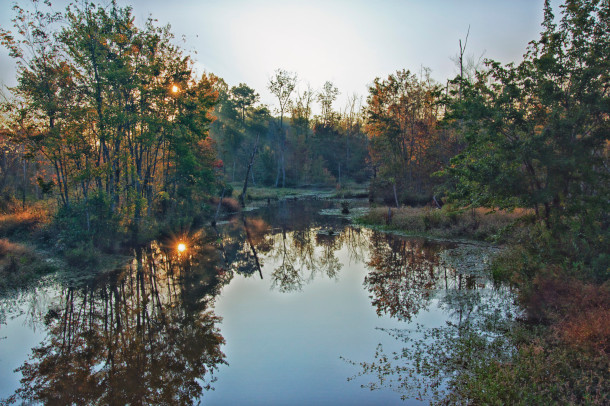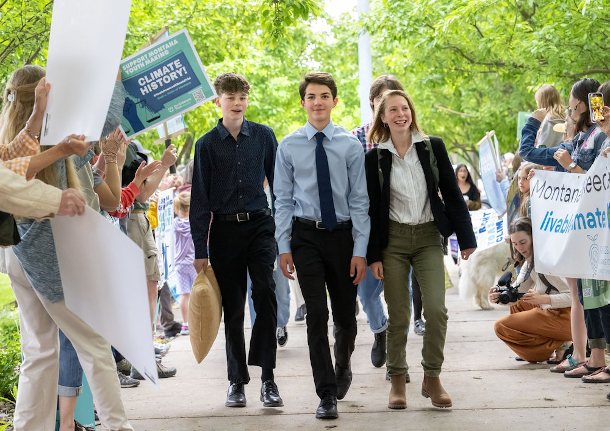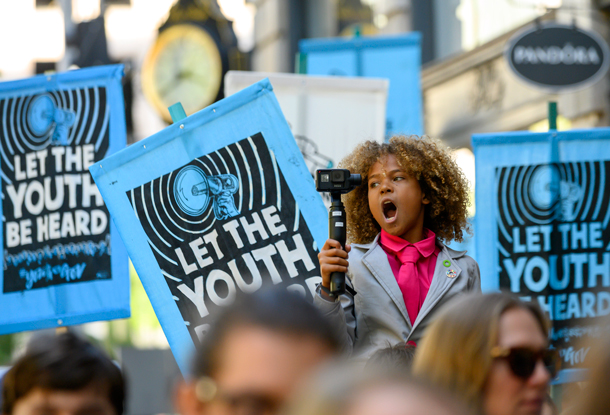Key Court Cases of 2023
Air Date: Week of January 5, 2024

The United States Supreme Court reversed five decades of legal precedent when it cut wetlands protections in the Sackett v. EPA case. (Photo: Susan Melkisethian, Flickr, CC BY-NC-ND 2.0)
2023 saw some notable environmental decisions in U.S. federal and state courts, from the Supreme Court’s removal of some wetlands protections to the landmark win for youth plaintiffs in a Montana climate case. Law professor Pat Parenteau joins Host Steve Curwood to explain what these decisions could mean for environmental law and policy going forward.
Transcript
O’NEILL: It’s Living on Earth, I’m Aynsley O’Neill.
CURWOOD: And I’m Steve Curwood. 2023 saw some notable environmental decisions in U.S. federal and state courts, and this year brings the prospect of even more. So of course, we called up Pat Parenteau, Emeritus Professor of Law at Vermont Law School. Happy New Year, Pat!
PARENTEAU: Hey, Steve, Happy New Year to you. Good to be with you, as usual.
CURWOOD: Always glad to have you, Pat. Hey, let's take a moment now to go over some of the crucial environmental court cases from last year. What happened in the United States in 2023 that we'll be seeing the consequences of this year, 2024?
PARENTEAU: Well, probably leading the list would be the Supreme Court's decision in the Sackett case involving the wetland in northern Idaho where the court has now redrawn the geographic scope of the Clean Water Act and greatly reduced it. And we haven't yet seen the full implications of this decision. But it's rolled back the power of the federal government to protect wetlands and small streams all across the country. By some estimates, as much as 50% of the remaining wetlands in the country are now at risk, because they now no longer have federal protection. And of course, EPA and the court had no choice but to accept the ruling of the Supreme Court in Sackett. And so they've now issued a rule, basically saying our jurisdiction now is greatly limited. There's still some questions about just how many streams are still covered by federal law and how many are not, and what the fate of those streams and their associated wetlands are going to be, particularly in states where there is no gap-filling state law to replace the loss of federal protection with state protection. And that is true in about 27 states across the country. So in 2024, what we're going to see in water quality and wetlands protection is, frankly, a lot of chaos. I mean, wetlands are the nature's kidneys, as they're called by the scientists, meaning they cleanse a lot of the pollutants that would otherwise get into water supply.

Wetlands conservation is critical to keeping drinking water clean, as well as combatting biodiversity loss and climate change. (Photo: Jim Liestman, Flickr, CC BY-NC-ND 2.0)
And EPA has done extensive studies showing the connection between protection of streams and wetlands, and drinking water supplies. So when you take away nature's protections for water quality, you have to replace it with artificial means of protecting it. And those costs have not yet been calculated, either. A lot of people were saying Sackett was supposed to resolve the question of federal jurisdiction, but it certainly doesn't resolve the question of what's the fate of these waters that are no longer subject to federal law, they've been subject to federal law for over 50 years. I mean, this is very similar, of course, to the Dobbs decision, overturning Roe v. Wade. 50 years of law is now no longer the law of the land. So, a lot of uncertainty around wetlands and water quality in 2024.
CURWOOD: All right, hey, let's talk about efforts to bring the government to action when it comes to climate disruption. There are a couple of key cases that are going on, Pat, what about the one in Montana?
PARENTEAU: Yeah, so this was a breakthrough case, precedent-setting case where Our Children's Trust, which represents youth plaintiffs in cases, frankly, in every state in the United States, finally won a major victory in Held v. The State of Montana, where a lower court in Montana ruled for the first time that there is a constitutional right, based on state constitutional law, to basically a stable or safe climate system. And the Montana court ruled that the state of Montana's energy policy was violating the youth plaintiffs' constitutional rights under the Montana constitution, because it was forbidding the state agencies from considering the effects on the climate system from continued production of oil and gas and coal. And of course, Montana is one of the major producers of fossil fuels in the country.

Youth plaintiffs Badge Busse, Mica Kantor, and Eva L. are cheered on by supporters as they arrive for their second day of the Held v. Montana trial in June 2023. (Photo: Robin Loznak/Courtesy of Our Children’s Trust)
So now that case goes on appeal to the Montana Supreme Court. So we will see a decision probably this year from the Montana Supreme Court. The betting, I guess, I would say is that the Montana Supreme Court is likely to uphold Judge Seeley's decision in Held because she did such a great job of building a record to support her rulings and making the case that the state's policy was not only illegal, but stupid. I mean, telling agencies not to consider what the science is telling us is the effects of continuing to burn fossil fuels. That doesn't make any sense at all. So the Held case is going to be the first time I think we will see a solid court decision recognizing a constitutional right to a stable climate. So the question is going to be once the courts enter the arena, if you will, of climate law and climate remedies, what exactly are they going to start ordering governments to do? State governments, and a little later, we may talk about the federal government in the Juliana case as well. But right now, I think it's interesting to watch how these various state courts deal with these constitutional questions. And we're testing the limits of the power of the courts to deal effectively with a problem as massive as climate change.

Youth plaintiff Levi Draheim rides on the shoulders of a supporter as he makes his way to a rally following a hearing in the Juliana v. United States climate change lawsuit. (Photo: Robin Loznak/Our Children’s Trust)
They're not going to order an immediate decarbonization, right, of the entire economy, the energy system, the transportation system. But what they will do, perhaps is begin to demand that the government start looking more at specific actions, not just promises of future decarbonisation like net zero by 2050. We see that terminology used a lot in climate law. It doesn't mean much. The question is, what are you doing today, to reduce emissions and to promote renewable energy, solar and wind and battery storage, and so forth? So we will see, I think starting in 2024, how far are courts going to be willing to go in ordering specific actions by the government or ordering the government to stop promoting fossil fuel development. I mean, the United States is the world leader in both oil and gas production. And we're still building new export terminals for oil and gas. Part of it's related to the war in Ukraine, of course, but it's a bigger economic question than that. So lots to look forward to on that front in 2024.
CURWOOD: Yeah, talk to me about the federal case, the Juliana case. That's in Oregon, but it's in federal court. What's going on with that?
PARENTEAU: Yeah, so that case was dismissed by the Ninth Circuit now almost two years ago. And so now it's back before the Oregon federal district court in Eugene. And back before Judge Ann Aiken, who was the judge in the original Juliana case. Judge Aiken has just issued a decision within the last few days, denying the Biden administration's motion to dismiss the case throw it out, and ruling that no, the court has jurisdiction, it's going to allow the youth plaintiffs led by Kelsey Juliana. And she is ordering the case to proceed to trial. The Biden administration is vowing to fight this and take it up to the ninth circuit and if necessary, probably all the way to the US Supreme Court and refusing to acknowledge that the court has any jurisdiction to have a trial on the federal government's actions and inactions dealing with climate change.

The Arctic National Wildlife Refuge (ANWR) is one of the largest national wildlife refuges in the United States. It is considered one of the country’s last untouched areas of wilderness. In 2023, the Biden administration canceled seven ANWR oil and gas leases that had been put in place during the Trump presidency. (Photo: Hillebrand, USFW, Flickr, Public Domain)
Of course, the Biden administration has done a lot. Done more than any administration, in fact. So you know, one of the puzzling things to me is, why doesn't the government just show up for trial and defend its record, if that's what it wants to do? And it could also point out that it's doing as much as the current law allows. And, you know, it's also trying to get Congress to pass new laws, it was very successful with the Inflation Reduction Act, which is the biggest investment in renewable energy and clean energy that we've ever seen. So, you know, the question is, why is the Biden administration digging in its heels and refusing to even have a trial to let the youth plaintiffs have their day in court? And, of course, the big question is, would a decision recognizing a constitutional right under the federal constitution to a safe or stable climate, would that survive ultimate review in the United States Supreme Court? The odds of that are long, obviously, with this very conservative court. But as Judge Aiken was saying in her recent decision, the plaintiffs here, the young people here have a right to make their argument and get a decision. That's what courts are supposed to do. When there's an allegation of a violation of fundamental constitutional rights, it's the job of the courts to say what the law is. And so that's what Judge Aiken has ruled. She is going, unless she's stopped, she's going to proceed to hear the case, hear the evidence, and issue a ruling on whether there's a constitutional right under the 14th Amendment, due process clause, to a safe climate system for the future of these young people.
CURWOOD: Now, Pat, you're the lawyer. I am not, but just to spin forward for a moment, if Juliana were to win at even the trial level, one of the remedies might be to say that the United States government has all this fossil fuel that it's spewing out into the air, that it has all these coal reserves, that it's saying, hey, it's gonna move ahead with what's in Alaska, and that at the very least, the government could stop making the situation worse.
PARENTEAU: Right.
CURWOOD: I wonder to what extent the Biden administration is concerned that there might be such a remedy type ruling that would, you know, go right in the face of the fossil fuel industry, which is so powerful in this country?

Pat Parenteau is emeritus professor of law at Vermont Law School and formerly served as EPA Regional Counsel. (Photo: Courtesy of Vermont Law School)
PARENTEAU: Yeah, I think that Biden administration faces a dilemma. On the one hand, I think it's fair to evaluate what they've been doing as the most aggressive policies we've seen. You have the president setting aside areas of high environmental value in Alaska, in public lands in the West national monuments, national parks, Chaco cultural area where there's a lot of oil and gas and saying, we're not going to continue to develop oil and gas around these high value areas in our country. But on the other hand, we are going to promote oil and gas development in the Gulf of Mexico, in certain places in Alaska, both because we are in a position where we can't simply stop producing oil and gas immediately. And also, because the laws on the books don't let us do that. Don't let us just declare, for example, a permanent moratorium on oil and gas development. And courts have ruled that the Biden administration can't do that. So Biden is in a bind, he wants to move as aggressively as possible towards cleaner energy sources, for example, electric vehicles, for example. But he's constrained in part by the law on the books, and in part by the reality that you can't simply turn on a dime and flick a switch and become clean and green overnight. So that's where we are. And these court cases are pushing the boundaries, pushing the government to do more of what it can do, and less of what it really shouldn't do and doesn't need to do. So, it's a difficult, complicated situation we find ourselves in. And the science is just getting more and more dire, the consequences are becoming more and more real every day. And so that's kind of where we are. And obviously the courts only have a limited role to play in all of this, but they do have an important role to play.
CURWOOD: Pat Parenteau is an emeritus professor of law at the Vermont Law School. Pat, thanks so much for your time and wisdom today.
PARENTEAU: Thank you, Steve.
Links
Listen to our previous coverage of Sackett v. EPA with Pat Parenteau
Listen to our previous coverage of Held v. Montana with Pat Parenteau
Learn about the most recent updates in the Juliana v. United States case from Our Children’s Trust
Living on Earth wants to hear from you!
Living on Earth
62 Calef Highway, Suite 212
Lee, NH 03861
Telephone: 617-287-4121
E-mail: comments@loe.org
Newsletter [Click here]
Donate to Living on Earth!
Living on Earth is an independent media program and relies entirely on contributions from listeners and institutions supporting public service. Please donate now to preserve an independent environmental voice.
NewsletterLiving on Earth offers a weekly delivery of the show's rundown to your mailbox. Sign up for our newsletter today!
 Sailors For The Sea: Be the change you want to sea.
Sailors For The Sea: Be the change you want to sea.
 The Grantham Foundation for the Protection of the Environment: Committed to protecting and improving the health of the global environment.
The Grantham Foundation for the Protection of the Environment: Committed to protecting and improving the health of the global environment.
 Contribute to Living on Earth and receive, as our gift to you, an archival print of one of Mark Seth Lender's extraordinary wildlife photographs. Follow the link to see Mark's current collection of photographs.
Contribute to Living on Earth and receive, as our gift to you, an archival print of one of Mark Seth Lender's extraordinary wildlife photographs. Follow the link to see Mark's current collection of photographs.
 Buy a signed copy of Mark Seth Lender's book Smeagull the Seagull & support Living on Earth
Buy a signed copy of Mark Seth Lender's book Smeagull the Seagull & support Living on Earth

